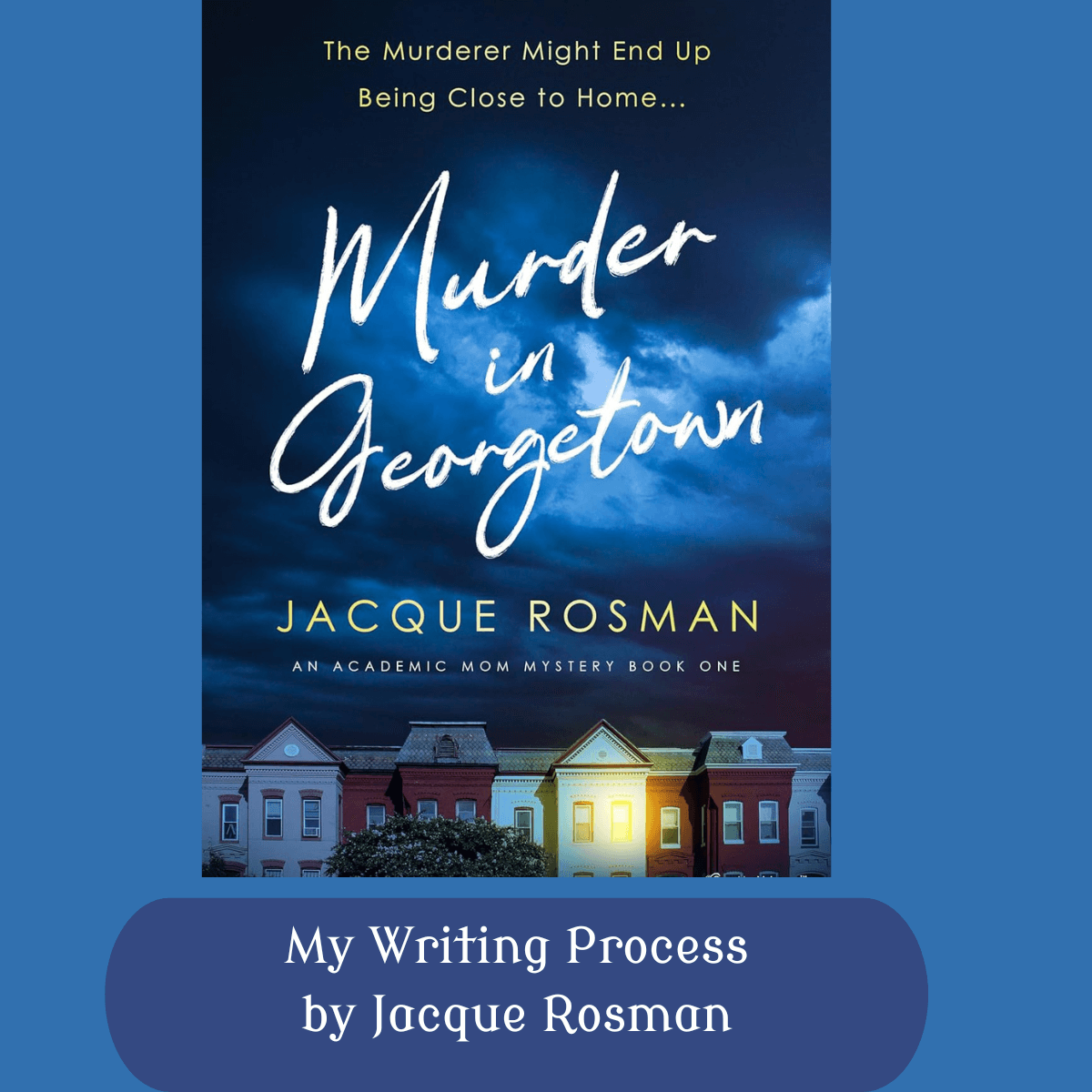by Jacque Rosman (Jacqueline Corcoran)
People often ask me, “How do you do it all?” I’ve published 20 textbooks, over a hundred journal articles and book chapters, and I’ve written countless book-length fiction manuscripts. Out of these, my Academic Mom Mysteries were just launched with the first in a 5-book series, MURDER IN GEORGETOWN.
The secret behind my productivity is that I generally work all the time. To be fair, I knew what I was getting in for, and I even chose my academic career partly because I had vague notions that professors were always working on an article and had some freedom to choose different activities based on their proclivities. As one of my colleagues joked, yes, we are free to do the kind of work we want, but that means we are also free to work all the time.”
At this point, I juggle so many projects that I never stop and count/recount them to others, as it would take too much time and energy away from actually trying to get those items done. My process is to prioritize work on deadline as this provides a sense of excitement. At any given moment, copyedits and proofreads on article and book manuscripts are due. These are some of my least favorite tasks; by this time, I’m pretty sick of the manuscript and am still seeing words and phrasing that I would change.
Tip: Prioritize deadlines
My next priority goes to projects that capture my fancy. Here, I’m fortunate in that I have flexibility, and work isn’t being imposed upon me. I might be in the mood to work on fiction. In addition to the Academic Mom Mysteries (I’m writing the third one currently), I have a couple of other fiction projects—a low magic, romantasy, and a cozy mystery set in the Shenandoah Mountains. Then, I grind to a halt sooner rather than later because I don’t know what comes next. I’m more on the side of a pantser than a plotter, but I’ve suffered all the drawbacks that come from writing that way, such as being stuck for months at a time, throwing plot at my characters rather than having plot interact with a character arc, and being frustrated at feeling so stuck. When I’m stuck on my fiction, I turn to academic writing. Not as much is required craft-wise (description, tell-not-show, original imagery), and, more importantly, I’m typically synthesizing knowledge that exists already. I am not pulling ideas out of thin air, which sometimes feels impossible.
Tip: Go to where you feel inspiration, even just a little.
I used to have critique groups/partners so that I could keep up the accountability. Because I wasn’t getting paid to write fiction, it was sometimes hard to build up the necessary motivation and justification. Critique groups kept me to a schedule. At this point, from teaching for decades, I read, edit, and evaluate so many papers that I can no longer do the swap manuscript trade-off anymore. I’m at the point now where I would rather pay to have someone read at the level of a critique partner (let’s call it beta reading) on chapters as they develop to see what’s working, what’s not, what am I overlooking? If I don’t get feedback, I feel a bit like I’m stumbling around in the dark rather than being productive and moving forward.
Tip: Get early feedback
One piece of advice that almost everyone spouts is to write first thing in the morning.
In the morning, my level of creativity is like a heavy shovel trying to dig into dry dirt. Just the tip of the shovel goes in, and a little dust flies up. I’m better in the later parts of the day for creativity.
Tip: Write toward your peak energy levels. For many people, it will be the morning when they’re fresh.
Even for someone relatively self-disciplined, the social media sirens are a constant curse. Whenever I hit a roadblock, grinding to a halt and wondering what I should write next, I click on Facebook or “check e-mails.” This can be the escape hatch I was seeking. Don’t feel bad about being distracted by online content. It is designed using behaviorist principles to train us with hits of dopamine. We want to escape the work and we don’t even have to budge to distract ourselves. We can fool ourselves that since we have been sitting here for so long, we give credit for “working.” Understand that another behaviorist principle is that if we use something (online distractions) as a way to escape or avoid, we are actually strengthening that impulse through negative reinforcement. That’s the way it becomes a pattern of behavior that’s difficult to break.
Tip: Do what you can to avoid online distractions as it’s a hard-to-break habit, having been designed that way.
When I start to get serious, I write a list. I inevitably have already done a couple of the items, but I write those down, too. I also make sure to break tasks down into small pieces. It’s not “do reference list,” but “do ref #1,” “put citation #1 in text, etc. Sometimes in a day, I can reach 30 or more items this way. I give myself credit for each little task by scribbling it out furiously after I’m done.
Tip: Use detailed lists to avoid spinning around, doing nothing.
Word count is a popular goal-setting method these days, as is tracking them on Excel spreadsheets. You might think from the level of compulsivity that I would like such a logical tracking device, but the rows and columns don’t fit my frame. Personally, I only do word count goals in writing challenge months. I do National Novel Writing Month and the April and July camp versions. I used to do a Twitter writing monthly channel fairly regularly. These challenges motivate me for word count because of the camaraderie, the competitive aspect, and the group energy that carries a project along.
Tip: Use Writing Challenges
For the same reasons named above, I attend three different write-ins a week. These involve meeting with a group on Zoom for a specified time to write. Usually, the first 5-10 minutes is spent with introductions and goal-setting for the writing time. Then, we go dark for a period of time that is agreed in advance to write the goal. I co-facilitated the National Novel Writing Month Washington DC region, and we gathered on early evening Sundays for local bookstore write-ins; the testimonial there was that everyone beat their daily word count goals in those spaces.
Tip: Use Write-Ins
These are some of the ways that I am productive. I aim for 8 hours of sleep every night, so this routine doesn’t cut into sleep. Could I improve on my process? Absolutely! I could work for shorter bursts and keep my attention on the big picture rather than getting lost in detail, but that’s a topic for another day. Do you find any of these tips among your repertoire? What do you do that keeps you productive?

Jacque Rosman is the pen name for Jacqueline Corcoran for the Academic Mom Mysteries, with the first in the series Murder in Georgetown. https://www.amazon.com/Murder-Georgetown-Academic-Mom-Mysteries/dp/1645409031/
Like her protagonist, the author lives in the DC area with her husband, two children, and three rescue pets. By day, Jacqueline is an Ivy League professor. She likes hikes, tennis, writing, and sunshine. Follow her at https://www.facebook.com/JacquelineCorcoranAuthor
Productivity Tips for Writers from Jacque Rosman: Share on X

I write in the evenings as my brain doesn't come on until noon.
You certainly work a lot of projects! But you do what a lot of writers want to – you write for a living. Well done.
And my brain doesn’t work *after* noon, ha. If you and I could combine our biorhythms, we’d be unstoppable!
Thanks so much for the great post! My "magic hours" are early in the morning, so that's when my writing (mostly) gets done. I also like write-ins and can usually get a ton done during those.
Thank you for sharing the way you organize yourself. I think it is important to have focus and keep oneself organized. Otherwise, there's this temptation to go in far too many different directions…
That’s always a temptation, isn’t it?
That's great you have so many techniques to stay productive. And you have lots of projects to work on.
Sometimes more than one technique is needed, for sure! We have a very distracting world, ha.
I love lists. I will barrel through them early so I can cross off as much as possible before lunch.
Me too! Then I come up with more lists for the afternoon, ha.
These are some great tips, especially 'Write toward your peak energy levels' and don't procrastinate! Just write.
I start writing about the plot I am thinking, no matter where in the story I was the last time. The plot just turns out amazing!
That’s great, Prisha! Thanks for coming by.
Thanks for the tips and advice. I am very easily distracted and taken off course.
I think all writers are. :)